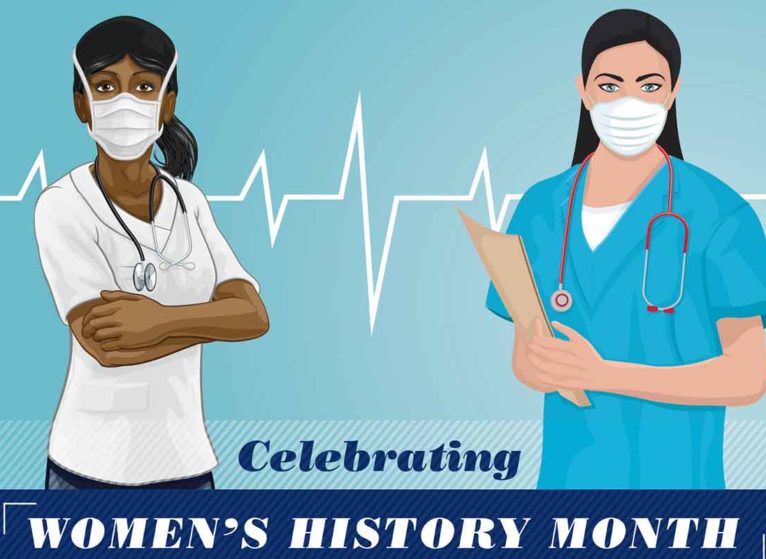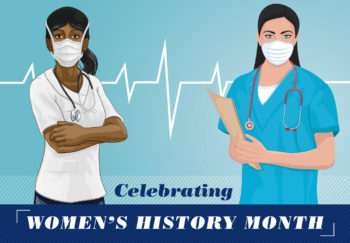To succeed as a gynecologic oncologist (gyn-onc), much is required. Self-confidence, focus, determination — these are essential. But you also need to build relationships. As a surgeon who treats ovarian, cervical, and related cancers, you treat patients with both surgery and medicine. This means more time with your patients. You get to know them and their families really well. And you get to really know yourself.
We spoke with two gyn-onc doctors. Both of them talked about the challenge of balancing care for patients, self, and family. Their stories and advice could apply to any woman in a male-dominated profession.
About this series: The path to becoming a surgeon is never easy. But for women, who have historically been underrepresented in the field, the barriers to becoming a surgeon are even higher. This March, UVA Health joins the national commemoration of Women’s History Month by celebrating just a few of our history-making female surgeons.
Kari Ring, MD: Finding Your People & A Voice
Kari Ring, MD, talks about the challenges and inspirations that have shaped her and her work.
Q. What inspired you to go into medicine as a profession? And why surgery?
I have always known I wanted to be a doctor. I really have no idea why, but in fourth grade my best friend and I would prepare written exams for each other. His father was a physician, which is where we obtained said exam questions.
I realize and am frequently reminded by my children what a nerd I am. But I've always been fascinated by science in general, by the human body and how it works.
I actually never thought I would be a surgeon until my third year of medical school. I found myself drawn to procedures and the immediate gratification that comes with finding a problem and fixing it.
I have always been an athlete. Not a good one, but an athlete. And the operating room really is like a high-performance sport, including the pressure that comes with it.
I also love that the OR is focused. Other distractions in medicine and life fall away. I can spend hours in the OR, and it only feels like minutes have passed.
Q. What made you choose your specialty?
My father was diagnosed with colon cancer when I was in college. My father’s cancer specialist really was an inspiration for how to care for patients and their families. When I started medical school, I thought I wanted to be a medical oncologist. But I found I loved both general surgery and OB-GYN care. When I discovered gynecologic oncology, everything clicked.
Gyn-onc is very unique. We both operate and give anti-cancer therapies like chemotherapy, immunotherapy, and biologic therapies. This allows for long, sustained relationships with patients. I felt like I just found my people.
Q. What does it take to be a successful surgeon?
Oh gosh. If anyone has the answer to this, please let me know!! I think in order to be competent and ultimately successful, you have to do enough surgeries to have the skillset for difficult cases.
But being successful is so much more than being an excellent technician. You have to have the self-confidence to do difficult cases, and the resilience to recover from complications. Because every surgeon has complications. But it is how you learn from them and improve that makes you better.
Q. Did you have any role models yourself and, if so, how did they impact your decision to become a surgeon?
Oh, too many to name! I feel very strongly that all of our life paths and successes are the results of the people we meet and learn from in life. Each mentor helped build the blocks of who I am today as a doctor, surgeon, and person.
My high school tennis and volleyball coaches both taught me that team is family. The success of the team rides on everyone working together.
My high school marine biology teacher taught me to ask questions, to not be afraid to love what you do, and to embrace my inner science nerd.
My college thesis advisor really taught me how to perform a legit science experiment and how to write scientifically.
Megan Bray was the reason I went into OB-GYN in the first place. A single conversation with her as a medical student gave me the confidence to choose OB-GYN and ultimately gyn-onc.
Kathie Hullfish is my Zen life mentor. She reminds me to take care of myself.
Susan Modesitt, Laurel Rice, Peyton Taylor, Willie Andersen, and Amir Jazaeri were the 5 gyn-oncs I worked with on my rotation 4th year. They were all excellent surgeons but even better people. They all taught me to demand excellence of myself, but to also (and more importantly) be able to laugh at myself.
Since deciding to go into gyn-onc, my mentor team has continued to grow. I honestly feel so very lucky to learn from such smart people on a daily basis.
Q. Do you think of yourself as a role model for other women who want to become surgeons?
I hope so. I try to talk very honestly with medical students and trainees about the ups and downs of being a surgeon, being a female surgeon, being a relatively young surgeon (I am only slightly on the verge of my mid-life crisis), and being a mother.
Q. What aspects of practicing medicine do you like the most? Why?
I love the relationships I build with my patients and their families. They truly become like family members for our team. Because isn’t that ultimately what life is all about? Caring for others and taking care of one another.
I also love asking questions and developing research based on those questions. The field of cancer prevention and gynecologic oncology is rapidly changing. I love being part of research to better care for our patients.
Q. What was something that surprised you or you didn’t expect about practicing medicine?
I was surprised at just how hard it is to unplug from work. I found it much easier in medical school and during residency and fellowship. But as an attending, the buck stops with you.
I see it as a strength that I care about my patients. But it's also a weakness. I need the ability to recharge to take the best care of patients and my family. I have worked hard to actively unplug when possible to maintain resilience in my career.
Q. Have you felt gender was a barrier in any way to your success? If so, how did you overcome it?
As many women do, I have suffered at times from imposter syndrome. It has taken me time to really believe that I belong in academic medicine and in surgery. But as I've gained confidence, I've found my voice.
I think women also don't advocate for themselves as much as they should. I've had the great fortune of working with strong female mentors who have done this for me and taught me how to advocate for myself. I honestly think that the generation of women just ahead of me have really paved the way for female gynecologic oncologists/surgeons. In my field especially, being a female has been a strength rather than a barrier.
I have suffered at times from imposter syndrome... but as I've gained confidence, I've found my voice.
Kari Ring, MD
Q. Looking back, what would you tell your younger self that was just starting on her journey to becoming a doctor?
I would tell my younger self to believe in your abilities, to send the email that you are perseverating about, and to not be afraid to speak your mind.
Q. What keeps you sane?
I run a lot. Running is my therapy and my time to think.
My children also keep me sane/drive me insane in hilarious ways.
As a female surgeon with children, I have to constantly remind myself that I can be good at everything, but I may not be an A+ student in all facets of life at the same time. One of my biggest mentors told me that in order to be successful, each part of life has a gas pedal and stop pedal. You need to actively identify daily, weekly, monthly which areas need the gas pedal and which areas can slow down some. I try to keep this in mind when I am being hard on myself!!
Leigh Cantrell: Staying Grounded in What You Love
Leigh Cantrell, MD, discovered she loved using her hands. She advises others to never compromise.
Q. What inspired you to go into medicine as a profession? And why surgery?
I wanted to help people and was inspired by a local internal medicine physician, Dr. Dale Nash, in the small town where I grew up. I learned in medical school that I loved using my hands (making my grandmother very happy after all of those years teaching me to sew).
Q. What made you choose your specialty?
Gynecologic oncologists take care of patients from diagnosis to cure or death. I love that continuity of care! And we both operate and administer chemotherapy, so we know our patients really well.
We have to take care of each other. It is what makes life fulfilling!
Leigh Cantrell, MD
Q. What does it take to be a successful surgeon?
Determination, great mentors, and a supportive family.
Q. Did you have any role models yourself and, if so, how did they impact your decision to become a surgeon?
Yes, I trained at the University of North Carolina at Chapel Hill and have multiple male and female role models. Their influence led me to choose this specialty.
Q. Do you think of yourself as a role model for other women who want to become surgeons?
I try to be a role model. It’s tough to balance everything, so I definitely am not perfect!
Q. What aspects of practicing medicine do you like the most? Why?
I love taking care of patients, forming trusting relationships, and training the next generation of physicians. We need to take care of each other. It is what makes life fulfilling!
Q. What was something that surprised you or you didn’t expect about practicing medicine?
As I have aged, there is definitely a shift in the balance of work and home life, which I don’t think one thinks about when you are younger.
Q. Have you felt gender was a barrier in any way to your success? If so, how did you overcome it?
No, but there were many women before me who broke down barriers so that I could move through more smoothly.
Q. Looking back, what would you tell your younger self that was just starting on her journey to becoming a doctor?
Always stay grounded in what is important to you. Don’t compromise, ever.
Q. What keeps you sane?
Family, friends, and exercise.


All great role models = Megan Bray, Kathie Hullfish, Leigh Cantrell, Susan Modesitt, Laurel Rice, Peyton Taylor, Willie Andersen, and Amir Jazaeri were wonderful to work with as a team.
Retired UVA OR
Kathy Stacy, RN
Kathy, that’s so sweet of you! Thanks for your comment!